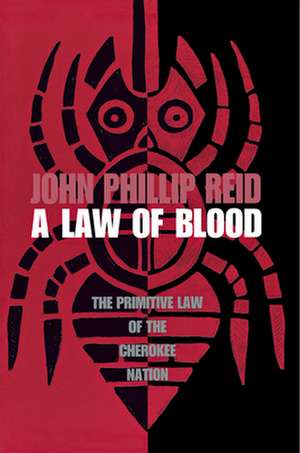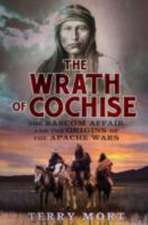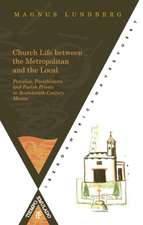A Law of Blood: The Primitive Law of the Cherokee Nation
Autor John Phillip Reiden Limba Engleză Paperback – 19 mar 2006
John Phillip Reid is widely known for his groundbreaking work in American legal history. A Law of Blood, first published in the early 1970s, led the way in an additional newly emerging academic field: American Indian history. As the field has flourished, this book has remained an authoritative text. Indeed, Gordon Morris Bakken writes in the foreword to this edition that Reid’s original study “shaped scholarship and inquiry for decades.”
Forging the research methods that fellow historians would soon adopt, Reid carefully examines the organization and rules of Cherokee clans and towns. Investigating the role of women in Cherokee society, for example, he found that married Cherokee women had more legal authority than their counterparts in Anglo-American society. In particular, Reid explores the Cherokees’ revolutionary attitudes toward government and the unique relationship between the members of the tribe and their law. Before the first European contact, the Cherokee Nation had already developed a functioning government, and by the early nineteenth century, the first Cherokee constitution had been enacted.
Forging the research methods that fellow historians would soon adopt, Reid carefully examines the organization and rules of Cherokee clans and towns. Investigating the role of women in Cherokee society, for example, he found that married Cherokee women had more legal authority than their counterparts in Anglo-American society. In particular, Reid explores the Cherokees’ revolutionary attitudes toward government and the unique relationship between the members of the tribe and their law. Before the first European contact, the Cherokee Nation had already developed a functioning government, and by the early nineteenth century, the first Cherokee constitution had been enacted.
Preț: 147.06 lei
Nou
Puncte Express: 221
Preț estimativ în valută:
28.15€ • 30.59$ • 23.66£
28.15€ • 30.59$ • 23.66£
Carte disponibilă
Livrare economică 31 martie-14 aprilie
Preluare comenzi: 021 569.72.76
Specificații
ISBN-13: 9780875806082
ISBN-10: 0875806082
Pagini: 352
Dimensiuni: 152 x 229 x 28 mm
Greutate: 0.52 kg
Ediția:Second Edition
Editura: Northern Illinois University Press
Colecția Northern Illinois University Press
ISBN-10: 0875806082
Pagini: 352
Dimensiuni: 152 x 229 x 28 mm
Greutate: 0.52 kg
Ediția:Second Edition
Editura: Northern Illinois University Press
Colecția Northern Illinois University Press
Recenzii
“Daring and convincing.” —Journal of American History
“Meaningful.... As a piece of legal history it is exemplary. As a piece of interpretive research it should not be overlooked.” —The Journal of Southern History
“Rich in detail and explanation.... Certain to remain an exemplary and frequently-referenced source for all students of Cherokee history and Native American history.” —Canadian Journal of History
“Meaningful.... As a piece of legal history it is exemplary. As a piece of interpretive research it should not be overlooked.” —The Journal of Southern History
“Rich in detail and explanation.... Certain to remain an exemplary and frequently-referenced source for all students of Cherokee history and Native American history.” —Canadian Journal of History
Notă biografică
John Phillip Reid is Professor of Law Emeritus at New York University and the author of numerous books on legal history, including Controlling the Law and The Ancient Constitution and the Origins of Anglo-American Liberty.
Cuprins
Table of Contents
Foreword - Gordon Morris Bakken One: A Race of Mountain Men: The People Two: A Source of Disunity: The Regions Three: A Leadership of Crisis: The Ascendency of Chota Four: A Rule by Consensus: The Towns Five: A Family Writ Large: The Clans Six: A Native Politeness: The Headmen Seven: A Nation's Mouth: The National Council and Speaker Eight: A Darling Passion: The Law of Coercion and of Equality Nine: A Right to Vengeance: The Law of Homicide Ten: A Way of Peace: The Mechanics of Vengeance Eleven: A Touch of Justice: The Mitigation of Liability Twelve: A Social Permissiveness: The Law of Marriage Thirteen: An Occupant's Tenure: The Law of Property Fourteen: A Nephew's Right: The Laws of Inheritance and Status Fifteen: A Way to War: The Law of the Nations Sixteen: A Gift of Scalps: The Law of Visitors and Retaliation Seventeen: A Bloody Hatchet: The War Machine Eighteen: A Beloved Occupation: The Law of Capture and Adoption Nineteen: A Path Swept Clean: The Making of Peace Twenty: A Still Hot War: The Keeping of Peace Twenty-One: A Scolding House: The Cherokee Legal System Twenty-Two: A Way of Dreaming: The Cherokee Legal Mind Twenty-Three: A People of Law: The Future Abbreviations Notes Acknowledgments Index
Descriere
John Phillip Reid is widely known for his groundbreaking work in American legal history. A Law of Blood, first published in the early 1970s, led the way in an additional newly emerging academic field: American Indian history. As the field has flourished, this book has remained an authoritative text. Indeed, Gordon Morris Bakken writes in the foreword to this edition that Reid’s original study “shaped scholarship and inquiry for decades.”
Forging the research methods that fellow historians would soon adopt, Reid carefully examines the organization and rules of Cherokee clans and towns. Investigating the role of women in Cherokee society, for example, he found that married Cherokee women had more legal authority than their counterparts in Anglo-American society. In particular, Reid explores the Cherokees’ revolutionary attitudes toward government and the unique relationship between the members of the tribe and their law. Before the first European contact, the Cherokee Nation had already developed a functioning government, and by the early nineteenth century, the first Cherokee constitution had been enacted.
Forging the research methods that fellow historians would soon adopt, Reid carefully examines the organization and rules of Cherokee clans and towns. Investigating the role of women in Cherokee society, for example, he found that married Cherokee women had more legal authority than their counterparts in Anglo-American society. In particular, Reid explores the Cherokees’ revolutionary attitudes toward government and the unique relationship between the members of the tribe and their law. Before the first European contact, the Cherokee Nation had already developed a functioning government, and by the early nineteenth century, the first Cherokee constitution had been enacted.







